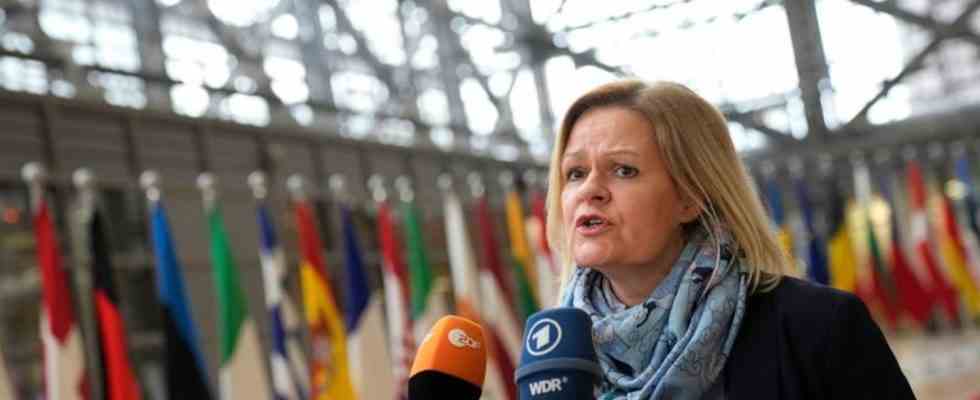migration policy
Faeser confident for asylum agreement in Europe
Interior Minister Nancy Faeser in Brussels. photo
©Virginia Mayo/AP
The EU countries have been arguing about migration policy for years. In the end, progress was slow. Can the really big reform still succeed? The German interior minister says yes.
Despite only sluggish progress in European asylum and migration policy, Federal Interior Minister Nancy Faeser is counting on comprehensive reforms before the European elections in spring 2024. “Putting asylum policy in Europe on a common footing is still my biggest goal and also the biggest goal of many other countries,” said the SPD politician on Thursday in Brussels.
Many parts of the reform have already been decided. This work must be completed this year. This is necessary so that the laws can still be adopted in this legislative period.
The background to this is the EU Commission’s proposals for a reform of asylum and migration policy from September 2020, which were intended to end a long dispute between the member states. So far, only small parts have actually been implemented, such as an expanded mandate for the EU Asylum Agency. The exact date for the European elections next spring has not yet been set.
Germany relies on Dublin rules
The EU states agreed in the summer on stricter rules at the European external borders and a reform of the database for taking fingerprints. Agreements with the EU Parliament on these issues are still pending. In addition, the 27 states are far from a solution on the core of a possible reform – the question of the distribution of people seeking protection and other forms of solidarity.
Currently, according to the Dublin rules, that EU state is usually responsible for an asylum application on whose soil the person seeking protection first enters European soil. Countries like Germany and the Netherlands are urging these rules to be followed. States on the external borders, on the other hand, are demanding more support. They are accused of not adhering to the Dublin rules.
Because there is hardly any progress on the question of the distribution of those seeking protection, the EU states have recently concentrated on better protecting the external borders. In addition, cooperation with countries of transit and origin, for example in Africa, should ensure that as few people as possible set off.
Faeser urges distribution across EU countries
Faeser now said: “It cannot be that we only talk about whether the borders around Europe will be raised, but it is about having a common asylum system with fair distribution.” Without such a fair distribution there will be no solution. The minister announced that Germany would take in survivors of the boat accident that killed more than 70 migrants off the coast of southern Italy at the end of February. The number of people to be admitted should be in the “mid double-digit range”.
EU Interior Commissioner Ylva Johansson also made it clear that she believes in an agreement by early 2024. “We’re pressed for time. But it’s not an unrealistic schedule that we’re following.”
Italy’s Prime Minister wants to take drastic prison sentences against people smugglers in the Mediterranean. Meloni announced on Thursday after a meeting of the Council of Ministers that smugglers and backers could face up to 30 years in prison if accidents involving fatalities occur during irregular crossings. The right-wing government in Rome is reacting to the boat accident off the coast of Calabria in which at least 72 migrants and refugees died at the end of February.

